
UNDP Ghana’s YAI transforms lives through youth-led innovation
The Young Africa Innovates (YAI) programme championed by the United Nations Development Programme (UNDP) with funding from Mastercard Foundation, has transformed Ghana's approach to innovation, particularly among marginalised youth.
About 40 per cent of Ghana’s population is aged between 15 and 35, according to the 2021 Population and Housing Census, with this demographic group considered an untapped potential for economic growth.
However, challenges such as high youth unemployment currently at 14.7 per cent and an estimated 74 per cent failure rate among start-ups highlight a significant gap in support for young innovators.
The YAI programme seeks to address this gap by fostering inclusive innovation by empowering young individuals, particularly those excluded from the entrepreneurial ecosystem.
This includes women, persons with disabilities (PWDs), and rural youth who are often faced with multiple barriers, including limited access to resources.
The UNDP Ghana's Chief Technical Advisor for YAI, Dr Allen Anie, explained that the goal was to ensure that innovation “is inclusive and accessible, reaching those who are often left behind.
By providing these young innovators with the necessary resources and social networks, we aim to scale their initiatives into solutions that can make a real difference in their communities.”
YAI has a target of 70 per cent participation by female innovators underlying UNDP's gender commitment to national development.
Scouting process
Throughout 2024, UNDP and its partners such as the National Entrepreneurship and Innovation Programme (NEIP), the Ministry of Education, and the Ghana Federation of Disability Organisations, conducted a nationwide scouting process identifying almost 10,000 innovative youth across Ghana.
![]()
Some of the innovators during a bootcamp
Some of these young innovators have since been selected for further support through 26 residential boot camps across the country so far, and a bespoke Accelerator Programme designed to help them scale their ventures and drive impactful change in their communities.
This initiative is ensuring that the voices of marginalised communities are heard and their ideas supported.
“By fostering an environment where the creativity of these atypical innovators is not hindered, we believe we can unlock innovative solutions that will contribute to national development,” the Resident Representative of UNDP in Ghana, Niloy Banerjee, said.
Vulnerable population
Approximately 43 per cent of Ghana's population resides in rural areas, where limited infrastructure, low literacy and the lack of access to capital pose significant barriers to entrepreneurship, while rural youth face nearly double the unemployment rates of their urban counterparts.
African women entrepreneurs, however, face a $42 billion financing gap, with only 16-20 per cent able to access long-term financing.
In Ghana, female entrepreneurs are eight per cent less likely than men to secure the capital and financial services needed to start or grow their businesses.
YAI seeks to address these and other gaps by providing grants to help young innovators develop, test, and refine their ideas, including individuals without formal financial records such as bank accounts or credit histories.
However, financial support is only part of the solution.
Through the programme, participants are connected with experienced professionals who guide them through the entrepreneurial landscape, offering insights and support to help their ideas evolve into scalable ventures.
Under YAI, training and support are offered in local languages using culturally relevant materials to ensure that those with limited English literacy can fully engage with the content.
This accessibility, combined with experiential learning and peer-to-peer mentoring, creates an equitable environment where all participants, regardless of their backgrounds can thrive.
Dr Anie stressed that “While YAI provides grants to empower young innovators, we recognise that social networks are crucial. Connecting participants with mentors is vital for their success, as these relationships help navigate the entrepreneurial landscape and ensure their solutions can scale”.
Background
In Ghana, about eight per cent of the population faces varying degrees of difficulty in carrying out everyday activities due to disabilities.
The YAI programme is committed to empowering PWDs.
Through collaboration with organisations such as the Ghana Federation of Disability Organisations (GFD), YAI ensures that youth with disabilities are included.
The programme offers specialised training and accessible learning materials tailored to the unique needs of PWDs, helping them to overcome the barriers they face in entrepreneurship and innovation.
“YAI is a vital step toward inclusion for persons with disabilities.
Their unique perspectives are invaluable, and I believe when supported, they can drive significant change in their communities and beyond,” the Executive Director of the Ghana Federation of Disability Organisations, Rita Kusi Kyeremaa, said.
Unlike many innovation programmes that focus on short-term gains, YAI is committed to ensuring that participant-developed solutions are sustainable and scalable.
Innovators are encouraged to tackle real-world challenges in critical sectors such as agriculture, health care and education, all considered areas vital for Ghana’s development.
“As we enter the scaling phase, we are committed to turning impactful ideas in sustainable agriculture, affordable health care, and educational technology into scalable businesses that generate jobs and promote economic growth for a more inclusive and prosperous Ghana,” Dr Anie stated.
